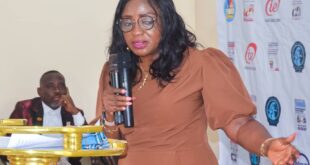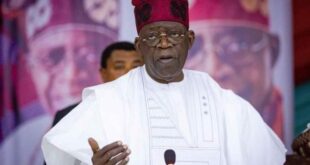Delta Guber tribunal’s Judges erred in Law – Ogboru
Chief Great Ogboru, the Labour Party Governorship Candidate in April 11, 2015, governorship election in Delta, and it party LP have approached the Court of Appeal Holden in Benin being dissatisfied with that part of the decision of the Justice N.U. Gummi led Governorship Election Tribunal, Asaba Delta State, to sit aside the judgment and grant the reliefs he sought.
The Justice N.U. Gummi led Governorship Election Tribunal on October 26, 2015 upheld the election of Senator Ifeanyi Okowas, as governor of Delta state, however Ogboru and his party is challenging the decision of tribunal containing adverse determination against the petitioner and the Tribunal’s failure to determine some issues submitted by the petitioner.
In a 22 grounds of notice of appeal filed by his counsel Mr. Dele Adesina, (SAN) on November 12th, 2015, with Petition No: EPT/DT/GOV/23/2015; the petitioners holds that, “their lordships of the Tribunal erred in law and came to a perverse decision when at page 101 they held that the appellants by presenting PW 2 [Subpoenaed INEC official] as a witness they vouched for his integrity and truthfulness despite his being declared a hostile witness and proceeded to find PW 2 a truthful witness and had “no reason to disbelieve him” and RW1.
Noting that, the tribunal erred in law when it placed reliance on the evidence of RW 1 at pages 102-103 of it judgment, on the alleged problems experienced by INEC with data upload, to hold at page 102 that “The evidence of RW 1, Mercy Ehikhmetalo a staff of the ICT department, INEC office, Asaba gave a final damaging blow to the evidence of RW15.”
Noting that “The evidence of RW1 relied on by the tribunal was oral evidence of official acts of INEC without any official document from INEC. The evidence of RW1 was inadmissible oral evidence of the official acts of INEC.RW 1 gave incredible and unreliable evidence.
Ogboru also stated that, “The Lower Tribunal misdirected itself, which misdirection occasioned a miscarriage of justice, when it placed heavy reliance on the uncorroborated and unsubstantiated evidence of RW1.
According to him “the finding of the Lower Tribunal is based on speculation. As the evidence of RW1 is inconsistent, contradictory and at variance with the case put forward by all the respondents in their respective replies to the petition.
Therefore, “the Lower Tribunal relied solely on the ipse dixit of RW1, preferring same to compelling documentary and oral evidence before it. And that It is the law that mere ipse dixit cannot be regarded to be credible or worthy of belief.
He added that having subpoena INEC to tender documents of voters’ accreditation Card Readers Report, “the burden of proof of irregularity, unauthenticity and incorrectness of the card readers and the card reader report rested squarely on the respondents, who challenged it.”
Ogboru stated also, that their Lordships erred in law at page 103 of their judgment having established, “The prima facie evidence of over-voting by the tribunal at page 97 of their judgment cannot at the same time be “absent, abstract or on an assumption,” as stated by their Lordships.
He added that the Tribunal erred in law when it struck out Exhibits P31-P41 (the voters registers) at page 101 of their judgment, and that “the lower tribunal concluded their evaluation of evidence and reached its decision without recourse to the Voters Registers which were Exhibits rightly admitted by it.
He also averred that, the Lower Tribunal erred in law where it finally held at page 107 paragraphs’ 3 of the judgment that “the only issue out of the four issues for the determination of the petition that favoured the Petitioners was issue three which upheld their locus standi to present the Petition.
He noted, at page 72 of the judgment, the Tribunal held regarding issue one that “we hold that issue one be and is hereby resolved in favour of the Petitioners”. And at page 91, the Tribunal held regarding issue three that “issue three is resolved in favour of the Petitioners and against the Respondents.
Stressing that, “this part of the judgment of the Lower Tribunal is inconsistent and self-contradictory.”
“The Lower Tribunal erred in law, when it failed to properly evaluate the evidence placed before it, ascribe probative value to it and put same on the imaginary scale in order to determine in whose favour the balance of justice tilted before reaching its conclusion to dismiss the petition and uphold the election and return of the 1st respondent. When all the admissible and credible evidence of the parties are placed on the imaginary scale of justice, the scale would inevitably tilt in favour of the Petitioners.
He added that, “the judgment of the Tribunal dismissing the petition and upholding the election and return of the 1st Respondent is against the weight of evidence.
Ogboru and LP in their reliefs before the Court of Appeal asked for: (i) an order allowing the appeal. (ii) An order setting aside all the parts of the judgment challenged in this appeal. (iii) An order granting the reliefs sought by the Appellants (Petitioners at the Lower Tribunal) in their Petition.
Subscribe to the Advocate News letter and receive news updates daily in your inbox.
 Advocate.ng Latest news update on politics, entertainment, sport and more
Advocate.ng Latest news update on politics, entertainment, sport and more



